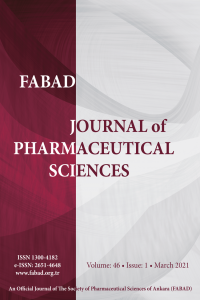Üçlü negatif meme kanseri hücrelerine folik asit polietilenimin polipleksleri ile gen aktarımı
Üçlü negatif meme kanseri (TNBC), meme kanserlerinin en agresif alt tipidir ve diğer meme kanseri türleri tarafından yaygın olarak eksprese edilen hormonal ve büyüme faktörü reseptörlerinden yoksundur, bu durum mevcut tedavilerle tedavi edilmesini zorlaştırmaktadır. Gen tedavisi terapötik bir seçenek olabilse de, genlerin TNBC hücrelerine aktarılması hala bir engeldir. Bu çalışmada, TNBC hücrelerinde aşırı eksprese edildiği bildirilen folat reseptörünü hedefleyen, folik asit (FA) konjuge edilmiş polipleks formülasyonları ile bu engelin aşılması amaçlandı. FA ve LPEI poliplekslerinin (FA-polipleksleri) kovalent olmayan kompleksleri altı farklı oranda hazırlandı. Karakterizasyon çalışmalarından sonra, hücre toksisitesi ve transfeksiyon yeteneği değerlendirildi. Folik asitin artan miktarlarda LPEI polipleksleri ile konjugasyonu, boyutu 204.1 nm’den 469.8 nm’ye yükseltti. PDI değerleri 0,31-0,51 arasında olup, zeta potansiyelleri pozitifti. Hücre canlılığı, polipleks formülasyonları uygulandıktan sonra, 3:1 (a/a) polimer:pDNA oranından ve 3:3:1 (a/a) FA:polipleks oranından başlayarak anlamlı oranda azaldı. 5:1 (a/a) polimer:pDNA oranının üzerinde, hücre canlılığı %70’in altına düştü. Polipleks formülasyonlarına folik asit eklenmesi, P3, P4 ve P5 formülasyonlarının sitotoksisitesini tersine çevirdi. LV-RFP pDNA, tüm formülasyonlar tarafından 4T1 hücrelerine başarılı bir şekilde aktarıldığı halde, floresan mikroskop görüntüleri optimum formülasyonların FA-P3 ve FA-P4 olduğunu gösterdi. Folik asidin poliplekslere kovalent olmayan konjugasyonu ile hazırlanan bu gen taşıyıcı sistem, LPEI poliplekslerinin hücre içine alımını arttırdı ve sitotoksisitesini azalttı. Folik asit-LPEI poliplekslerinin kovalent olmayan kompleksleri, folat reseptörünü eksprese eden kanser hücrelerine gen aktarımında kullanılabilecek gelecek vaadeden taşıyıcı sistemlerdir.
Gene Delivery To Triple-Negative Breast Cancer Cells By Folic Acid-Polyethyleneimine Polyplexes
Triple negative breast cancer (TNBC) is the most aggressive subtype of breast cancer and lacks hormonal and growth factor receptors commonly expressed by other types of breast cancer making it difficult to treat by conventional treatments. Although gene therapy might be a therapeutic option, delivery of genes into TNBC cells is still an obstacle. In this study, it was aimed to overcome this obstacle by folic acid (FA) conjugated polyplex formulations to targeting the folate receptor which has been reported to be overexpressed in TNBC cells. Non-covalent complexes of FA and LPEI polyplexes (FA-polyplexes) were prepared at six different ratios. After characterization studies, cytotoxicity and transfection ability were evaluated. Conjugation of FA by increasing amounts of LPEI polyplexes, increased the size from 204.1 to 469.8 nm. Their PDI values were between 0.31-0.51, and zeta potentials were positive. After treatment with polyplex formulations, cell viability was decreased significantly starting from 3:1(w/w) polymer:pDNA ratio and from 3:3:1 (w/w)FA:polyplex ratio. Cell viability decreased below 70% above the 5:1 (w/w) polymer:pDNA ratio. Addition of folic acid to polyplex formulations reversed the cytotoxicity of P3, P4 and P5 formulations. Although LV-RFP pDNA was delivered successfully into 4T1 cells by all formulations, fluorescent microscope images showed that, the optimal formulations were FA-P3 and FA-P4. This gene delivery system, generated by non-covalent conjugation of folic acid to polyplexes, increased the uptake and decreased the cytotoxicity of LPEI polyplexes. Non-covalent complexes of folic acid-LPEI polyplexes represent promising delivery systems in gene therapy, directed against cancer cells expressing folate receptors.
___
- Cesur-Ergün, B., & Demir-Dora, D. (2023). Gene therapy
in cancer. The Journal of Gene Medicine, e3550,
1-11. https://doi.org/10.1002/jgm.3550
- Costa, D., Valente, A. J., Queiroz, J. A., & Sousa, A. J. C.
(2018). Finding the ideal polyethylenimine-plasmid
DNA system for co-delivery of payloads in
cancer therapy. Colloids and Surfaces B: Biointerfaces,
170, 627–636. https://doi.org/10.1016/j.colsurfb.
2018.06.063
